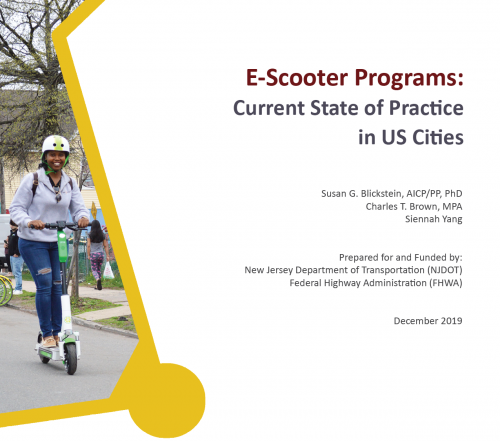In the US, dockless electric scooters (e-scooters) emerged in 2017 and have proliferated in many US cities in the past two or three years. The introduction of electric scooters is part of a larger shared micromobility investment trend – an innovative transportation strategy that provides users with short-term access to a bicycle/e-bicycle, scooter/e-scooter or other low-speed mode of transportation on an as-needed basis (Cohen and Shaheen, 2019). Shared micromobility services could replace/reduce personal vehicle use and ride-hailing trips and provide first and last-mile solutions for public transit (Populus, 2018). Because electric scooters are dockless, users typically locate, unlock, and pay for an e-scooter using a phone application. To operate them, users stand on the electric scooters’ narrow platform with one foot in front of another and can travel 15-20 mph.
Given e-scooters’ recent introduction into US cities, this study explores the current state of practice of integrating e-scooters into urban travel infrastructure, including pilot program structures, applicable State and local regulations, access and equity concerns, and other aspects of managing e-scooters in urban contexts. The goal of this white paper is to identify best practices for incorporating e-scooters as micromobility options in New Jersey communities.
For this analysis, eleven US cities that have piloted or are piloting an e-scooter program were evaluated. Cities were selected to reflect geographic variation and to represent the experiences of both large and smaller urban areas. Cities were also selected based on the availability of information on current or recent pilot efforts.
This study highlights e-scooter best practices that govern user accessibility/user trends, safety data, and right-of-way regulations. Details on each of the city’s e-scooter program are provided in an Appendix. We also present the recent New Jersey law that defines, and, to some extent, regulates e-scooters. Lastly, we identify key findings and concerns for consideration by New Jersey communities in adopting e-scooter share programs.
Read full report: E-Scooter Programs Current State of Practice in US Cities (2019)
New Jersey Bicycle and Pedestrian Resource Center. (2019). E-Scooter Programs: Current State of Practice in US Cities. Retrieved from https://njbikeped.org/wp-content/uploads/BPRC-E-Scooter-Study-2-2020.pdf
https://doi.org/doi:10.7282/t3-xc8e-tz93

